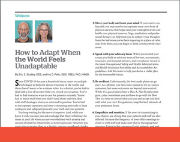How to Adapt When the World Feels Unadaptable
 Since COVID-19 became a household term, stress on multiple levels began to build for almost everyone in the world, and there doesn’t seem to be a release valve. As a dentist, you’ve had to deal with a loss of income while you closed your practice. You’ve had to find inventive ways to care for patients remotely. You’ve had to retain staff when you didn’t need them and then deal with staff shortages when you returned to practice. You’ve had to incorporate expensive and time-consuming protocols to limit contagion and safeguard yourself, your staff and your patients.
Since COVID-19 became a household term, stress on multiple levels began to build for almost everyone in the world, and there doesn’t seem to be a release valve. As a dentist, you’ve had to deal with a loss of income while you closed your practice. You’ve had to find inventive ways to care for patients remotely. You’ve had to retain staff when you didn’t need them and then deal with staff shortages when you returned to practice. You’ve had to incorporate expensive and time-consuming protocols to limit contagion and safeguard yourself, your staff and your patients. You keep waiting for the news to improve. And, while you know it will, you may also acknowledge that there will always be times in your life when you are overwhelmed with anxiety and unsure of what the future holds or how to proceed. However, you must also recognize that, as a dentist, you are considered a leader of the community and are expected to step up and take charge. So how do you navigate a constant stream of bad news while also trying to rebuild your practice and continue to help others?
1. Use your training. You should always follow professional guidelines. But when there are conflicting reports, which can you believe? You have been trained in evidence-based decision making and critical thinking. You can reduce your confusion by using that training to sort through the influx of information and determine which reports are most reliable. Base any changes in protocol on concrete evidence, then communicate both the changes and the rationale behind them to your staff and patients. In addition, you can help to curate the information processed by your patients and staff by sending them articles and videos supporting the best evidence.
2. Take breaks from news sources. While it’s important to stay informed, when we continually read or hear news that seems particularly bad, we can become overstimulated, further exacerbating our anxieties. Instead, change the channel. Put on some music. Watch reruns of shows from childhood. Do what you need to bring yourself back to a simpler time and to begin to calm your nervous system.
3. Move your body and train your mind. If your nerves are frazzled, you may need to incorporate some new form of physical exercise that helps raise your endorphin levels and builds your physical reserves. Yoga, meditation and professional therapy can help train you to redirect your thoughts from the bad news you’ve been ingesting to a place of calm, and, from there, you can begin to think constructively once more.
4. Speak with your advisory team. When you started your career, you built an advisory team of lawyers, accountants, insurance and financial advisers, and consultants versed in the latest Occupational Safety and Health Administration and Health Insurance Portability and Accountability Act guidelines. Ask this team to help you devise a viable plan for the foreseeable future.
5. Be resilient. Unfortunately, the best-made plans can go awry. As a dentist, you have been trained to try to control outcomes, but some outcomes are beyond your control. While it’s a good idea to have a Plan A, Plan B and contingency plan, sometimes you just have to go with the flow. This is a time to control what you can and accept and deal with what you can’t. For guidance, keep the best interests of your patients at heart.
6. Empathize and sensitize. If the news is traumatizing to you, chances are strong that your patients and staff are also affected. Increase the frequency of your office meetings to check in with staff and make sure they’re managing their stressors. Listen to the concerns of your patients, and realize that their anxiety levels are most likely through the roof. Instruct your staff to avoid controversial topics, and make sure you do the same.
7. Be grateful for what you have. When the news is bad, it’s easy to focus on everything that’s wrong and how it can get worse. Do yourself a favor, and remind yourself daily of all you have that brings you joy, contentment, security and ease.
8. Remember that this is just a moment in time. Though things could get worse, there is every reason to believe that they will get better. You have trained for this role. You have faced challenges throughout your career. All along the way, you have continued to care for and about others. This time, too, you will reorganize and persevere, and, as always, you will continue to practice and lead as the world changes around you.
Eric S. Studley, DDS, and Ivy D. Peltz, DDS, MSEd, PhD, MAGD, are the co-founders of Doccupations, an online algorithmic dental job-matching service. They are also retired New York University College of Dentistry general practice directors and clinical associate professors. To comment on this article, email impact@agd.org.
Check out the full issue of AGD Impact online now.
